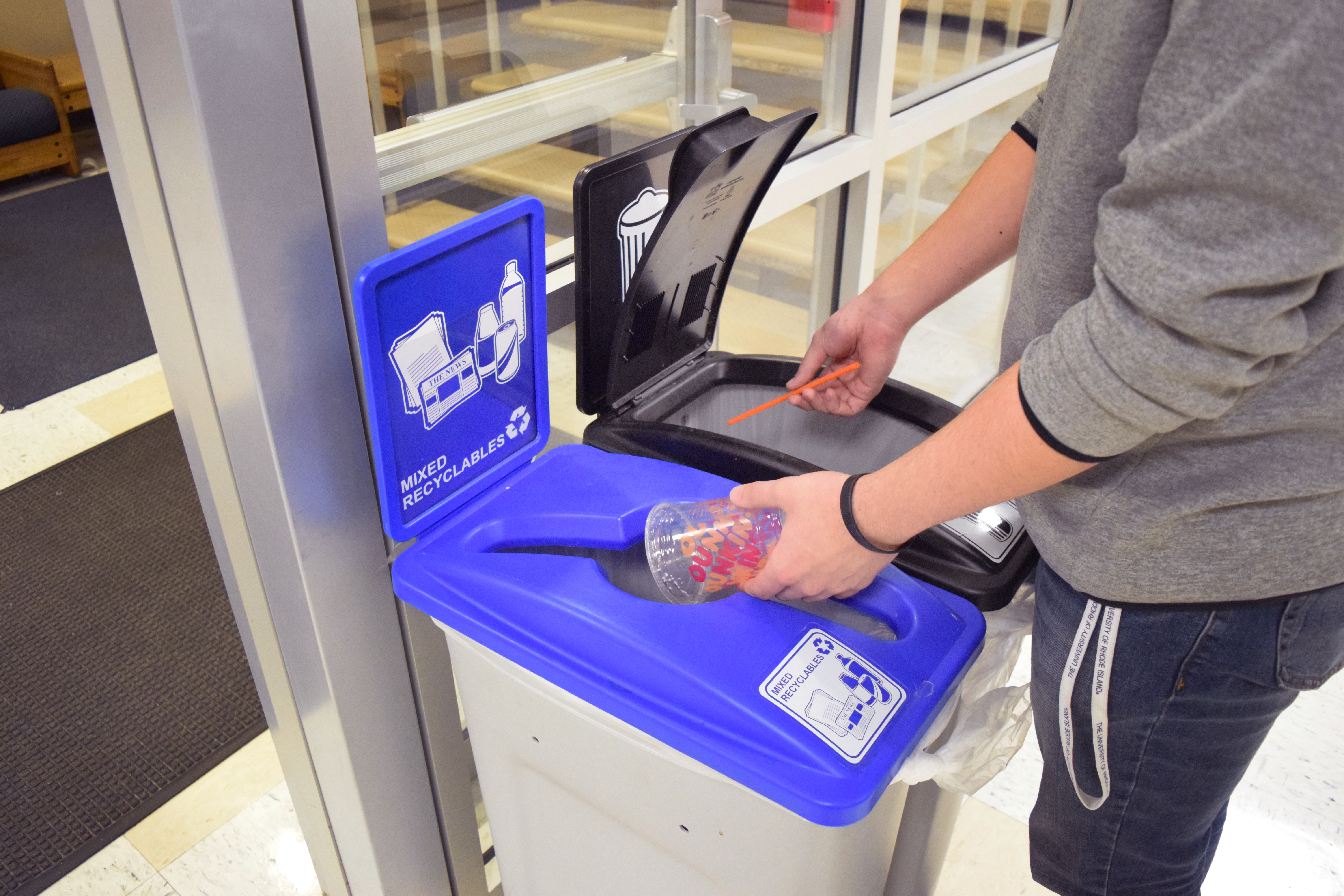The University may recycle, but do students recycle properly? Photo by Anna Meassick.
On average, the University of Rhode Island recycles almost 35 percent of the total waste produced at the University.
While the students primarily recycle cans, bottles, aluminum holders and plastics, the University as a whole recycles far more materials than that.
“It’s a hard number to pin down exactly,” Mary Brennan, the recycling and solid waste coordinator at URI said. “We as a University do scrap metals, palettes, wood waste, e-waste, toner cartridges, batteries, fluorescent tubes and even mattresses.”
One of the concerning issues around campus is the improper disposal of plastic iced coffee cups used by most students.
“Those can go in the recycling and I think most students don’t realize that,” Brennan said. “The worst part is they’re thrown [out] half full. They’re not even finishing it.”
Brennan has been the recycling and waste coordinator at URI since 2010. Over the last decade, she recalls that the recycling process has improved tremendously around campus.
“I’m happy to see that we’ve banned plastic bags in the book store and other establishments around campus,” Brennan said.
Additionally, the University now has various resources that promote an eco-friendly environment on campus, including a new recycling center.
“We now have a recycling center on campus right around the corner, off of Flagg Road,” Brennan said. “If you go there, you can see how we manage and sort our waste and recycle a great deal of waste.”
The University installed water refilling stations all around campus which has successfully diverted over a million water bottles from the waste stream.
“We work with the sustainability department and the plumbing shop, we’re installing those water bottle refill stations on campus,” Brennan said. “Our ultimate goal is that every bubbler is converted into a water bottle refill station. People don’t use those bubblers anymore because they think it is unsanitary.”
URI also has a unique toner cartridge recycling program that not many follow. Over four thousand toner cartridges have been recycled every year.
“You wouldn’t believe how many toner cartridges the University goes through in a year,” Brennan said. “We get those out of the landfill and we send them to somebody who refills that with ink and resells it. It seems silly to throw away this giant plastic unit that you use just once.”
Despite the various improvements that have happened over the decade, Brennan believes there is still much left that can be done to make a significant impact around campus.
“Move-in drives are crazy,” said Brennan. “Hundreds and thousands of water bottles get wasted on campus during move-ins. There are cases and cases of water bottles. They will take one sip of water, trash it and go get another one.”
The University’s biggest challenge is getting the information out to the students. Though the RAs are trained to encourage recycling, the extent to which the students are made aware of these issues is unknown.
“We’ve talked about doing a URI 101 class,” Brennan said. “We tried to do a program during move-in, but there are so many other programs that take priority. I don’t want to stick flyers under their doors, that just seems anti-recycling.”
The biggest cost for recycling is a charge levied upon a given quantity of waste received. It mostly falls on the cost of the trucks that come to the University and pick up the recycling and haul it to recycling facilities.
“I like the students to think about what they purchase, why they purchase it, and what happens to it after they purchase it,” Brennan said. “You have to look at the life cycle of the choices. A red solo cup is cheaper than a $15 stainless steel water bottle. It’s always better to spend a little bit more money that’s going to last longer.”
On the contrary, even though most students on campus are aware of recycling, they find it difficult to always recycle due to some inconveniences. “I am really big into being green,” Rose Keithan, a junior said. “I try to recycle as much as much as I can. I’m always running around campus with so much stuff and I’m a commuter. So bringing around a reusable cup [or] bottle is definitely more inconvenient, especially for coffee cause it can spill around my things.”





